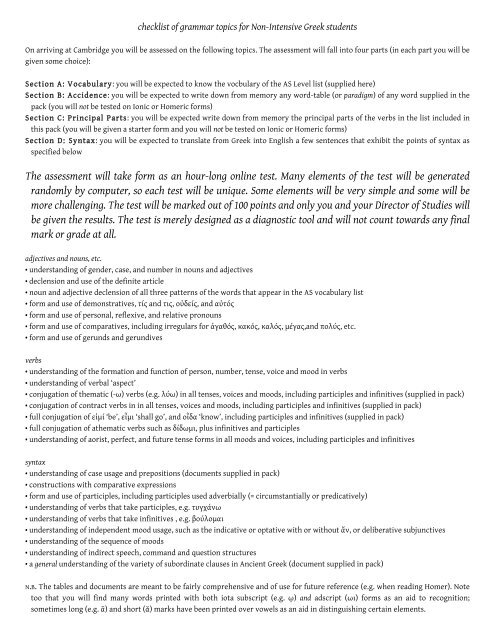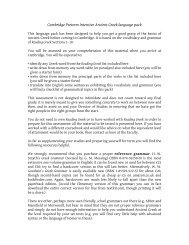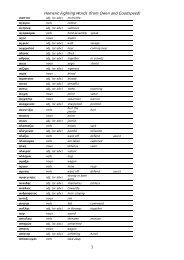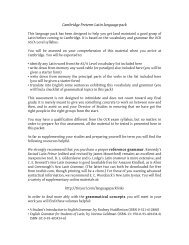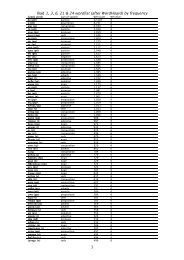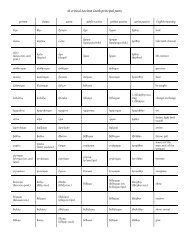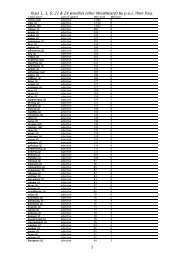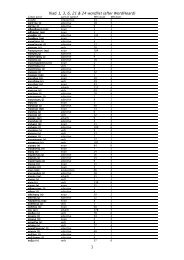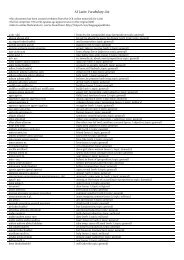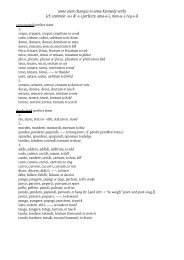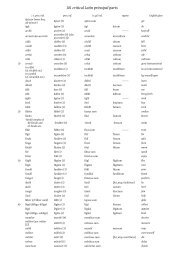Cambridge Preterm Non-Intensive Ancient Greek language pack
present stem forms - CW's language page
present stem forms - CW's language page
- No tags were found...
You also want an ePaper? Increase the reach of your titles
YUMPU automatically turns print PDFs into web optimized ePapers that Google loves.
checklist of grammar topics for <strong>Non</strong>-<strong>Intensive</strong> <strong>Greek</strong> students<br />
On arriving at <strong>Cambridge</strong> you will be assessed on the following topics. The assessment will fall into four parts (in each part you will be<br />
given some choice):<br />
Section A: Vocabulary: you will be expected to know the vocbulary of the AS Level list (supplied here)<br />
Section B: Accidence: you will be expected to write down from memory any word-table (or paradigm) of any word supplied in the<br />
<strong>pack</strong> (you will not be tested on Ionic or Homeric forms)<br />
Section C: Principal Parts: you will be expected write down from memory the principal parts of the verbs in the list included in<br />
this <strong>pack</strong> (you will be given a starter form and you will not be tested on Ionic or Homeric forms)<br />
Section D: Syntax: you will be expected to translate from <strong>Greek</strong> into English a few sentences that exhibit the points of syntax as<br />
specified below<br />
The assessment will take form as an hour-long online test. Many elements of the test will be generated<br />
randomly by computer, so each test will be unique. Some elements will be very simple and some will be<br />
more challenging. The test will be marked out of 100 points and only you and your Director of Studies will<br />
be given the results. The test is merely designed as a diagnostic tool and will not count towards any final<br />
mark or grade at all.<br />
adjectives and nouns, etc.<br />
• understanding of gender, case, and number in nouns and adjectives<br />
• declension and use of the definite article<br />
• noun and adjective declension of all three patterns of the words that appear in the AS vocabulary list<br />
• form and use of demonstratives, !"# and !$#, %&'("#, and )&!*#<br />
• form and use of personal, reflexive, and relative pronouns<br />
• form and use of comparatives, including irregulars for +,)-*#, .).*#, .)/*#, 01,)#,and 2%/3#, etc.<br />
• form and use of gerunds and gerundives<br />
verbs<br />
• understanding of the formation and function of person, number, tense, voice and mood in verbs<br />
• understanding of verbal ‘aspect’<br />
• conjugation of thematic (-4) verbs (e.g. /34) in all tenses, voices and moods, including participles and infinitives (supplied in <strong>pack</strong>)<br />
• conjugation of contract verbs in in all tenses, voices and moods, including participles and infinitives (supplied in <strong>pack</strong>)<br />
• full conjugation of (50" ‘be’, (60$ ‘shall go’, and %6') ‘know’, including participles and infinitives (supplied in <strong>pack</strong>)<br />
• full conjugation of athematic verbs such as '"'40$, plus infinitives and participles<br />
• understanding of aorist, perfect, and future tense forms in all moods and voices, including participles and infinitives<br />
syntax<br />
• understanding of case usage and prepositions (documents supplied in <strong>pack</strong>)<br />
• constructions with comparative expressions<br />
• form and use of participles, including participles used adverbially (= circumstantially or predicatively)<br />
• understanding of verbs that take participles, e.g. !7,89:4<br />
• understanding of verbs that take infinitives , e.g. ;%3/%0)$<br />
• understanding of independent mood usage, such as the indicative or optative with or without ) and short (?) marks have been printed over vowels as an aid in distinguishing certain elements.


